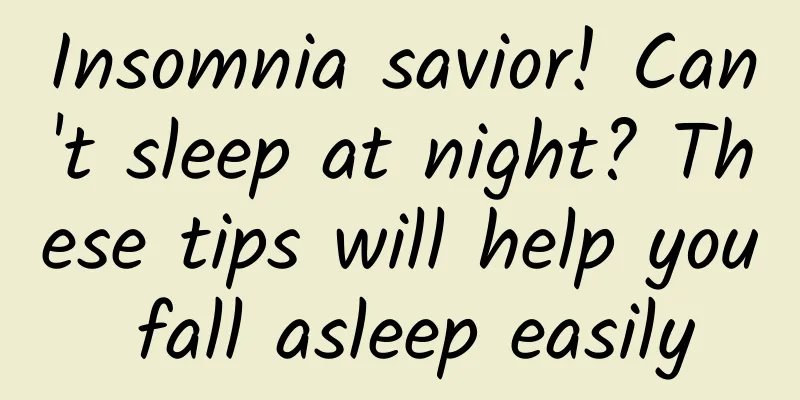Insomnia savior! Can't sleep at night? These tips will help you fall asleep easily

|
1. How long does it take to get a good night’s sleep? A: There are large individual differences in people's sleep needs. Some people need to sleep 10 hours a day to have sufficient energy to work the next day, while others only need 5 hours of sleep. The quality of sleep cannot be simply measured by the length of sleep, but by whether fatigue is eliminated and whether energy is sufficient. Generally speaking, people's sleep needs gradually decrease with age. Under normal circumstances, adults sleep 6 to 9 hours a day (children and adolescents sleep 8 to 12 hours a day, and the elderly sleep 4 to 6 hours a day), and they can be energetic the next day, so there is no need to worry about insomnia. 2. Does “snoring” mean a good sleep? Answer: Many people think that "snoring" is a sign of "sound sleep", which is actually a misunderstanding. "Snoring" is a sound related to nighttime breathing. It is also an important sign of upper respiratory tract stenosis. Snorers with severe upper respiratory tract stenosis often have loud, intermittent snoring, and pauses in the middle. Such snorers will suffer from frequent shortness of breath and apnea during sleep, which will cause hypoxia and discontinuous sleep. Although they sleep for a long time, they still feel not refreshed after waking up and are prone to drowsiness during the day. Over time, it can easily induce and aggravate high blood pressure, diabetes, heart disease and other diseases. 3. Does dreaming at night mean that you didn’t get enough rest? Answer: In fact, dreams are a common physiological phenomenon. Every normal person will dream 4-6 times during sleep. If we do not wake up while dreaming, we will not remember the dream and we will not know that we have dreamed. Regardless of whether we have the memory of dreaming or not, as long as we are in a good mental state the next day, we cannot think that we have not rested well. If you feel that you have been dreaming all night and your mental state is not good during the day, it does indicate that your sleep quality is poor and you need to relax, increase daytime exercise appropriately, etc. 4. If I don’t sleep well at night, can I make up for it during the day? A: This is a "remedy" that people with insomnia usually like to take. However, they do not know that catching up on sleep during the day will consume the sleep needs of the night. At the same time, catching up on sleep will reduce the time of wakefulness and activity, which will lead to a decrease in the motivation to sleep at night, thus aggravating insomnia the next night, thus entering a vicious cycle of "not sleeping well at night, catching up on sleep during the day". Therefore, even if you did not sleep well the night before, you still need to stay awake during the day the next day to do what you need to do and exercise. 5. What should I do if I can’t sleep at night? Answer: 1. Go to bed only when you are sleepy at night. Do some simple and relaxing things outside the bedroom before going to bed (such as reading paper books, writing, doing light housework, etc.). Go to the bedroom to go to bed only when you are very tired and sleepy. Do not do anything that is not related to sleep after going to bed; 2. If you have difficulty falling asleep after going to bed or wake up in the middle of the night and have difficulty falling asleep again, do not stay in bed all the time. You should get up and leave the bedroom, do those relaxing things before going to bed in other rooms, and go back to the bedroom to go to bed only when you feel sleepy again; 3. No matter how you sleep at night, you must get up on time in the morning, stay awake during the day, and avoid making up for sleep. 6. Can drinking alcohol before bed help you sleep? A: Some people want to get drunk before bed so that they can fall asleep easily. In fact, it is not true that drinking before bed helps sleep. Drinking before bed may shorten the time to fall asleep to a certain extent, but alcohol can cause restless sleep and early awakening. Because alcohol only works on the human body for more than 5 hours, and it works even less for people with fast metabolism. Many people feel weak and dizzy after waking up from a drunken sleep, because alcohol metabolism consumes oxygen, which leads to a decrease in sleep quality. In addition, alcohol has an inhibitory effect on the central nervous system. If you drink alcohol and take hypnotic drugs, you may increase the risk of death from respiratory depression. 7.What is insomnia? Answer: Insomnia is the most common sleep disorder, which refers to difficulty falling asleep, repeated awakenings, shallow sleep, short sleep duration, early awakening, and unrefreshing sleep (dissatisfaction with sleep) even when there are sufficient sleep opportunities and a suitable sleeping environment. It also leads to daytime functional impairment, including fatigue, inattention, decreased energy, daytime sleepiness, poor performance, depression, irritability, etc. 8.What are the standards for healthy sleep? Answer: 1. Able to fall asleep within 30 minutes after going to bed; 2. Wake up no more than once at night (more than five minutes), and be able to fall asleep again within 20 minutes after waking up; 3. No snoring or only slight snoring during sleep, and no abnormal limb movements; 4. 85% of the time in bed is spent sleeping; 5. Feeling energetic after waking up in the morning and able to maintain normal activities during the day. 9. What impact does playing with mobile phone before going to bed have on sleep? A: Playing with mobile phones, tablets, and all luminous electronic products before going to bed will disrupt the biological clock. The human biological clock is mainly controlled by melatonin, and playing with luminous electronic products before going to bed will directly reduce the melatonin level by 22%. Melatonin is a necessary substance to maintain the biological clock. Once it is reduced, it is not easy to fall asleep. Moreover, playing with mobile phones at night, whether it is reading WeChat, playing games, or reading stories, will stimulate the brain before going to sleep. These stimuli not only make it difficult for you to fall asleep, but may also bring these contents into your dreams. Image source: Pixabay 10. If staying up late is unavoidable, how can we minimize the harm caused by staying up late? Answer: 1. Sleep for a while before staying up late. 2. Supplement vitamin B. Vitamin B helps the body's cell metabolism and produces enough energy. It can also protect nerve tissue cells, calm nerves, and reduce anxiety and tension. 3. Avoid fried and grilled late-night snacks. Greasy and high-fat foods will increase the gastrointestinal burden. It is a healthier choice to match more vitamin-rich vegetables, fruits and low-calorie foods. 4. Replenish lost water at any time. Staying up late will cause endocrine disorders and water-oil imbalance. Not only the skin will lack water, but the body will also lack water, so you must drink more water when staying up late. Soaking wolfberry, chrysanthemum, longan, etc. in water is a good choice. 5. Get up and move every 1 to 2 hours. Source: Chongqing Mental Health Center Author: Wen Yan Statement: Except for original content and special notes, some pictures are from the Internet. They are not for commercial purposes and are only used as popular science materials. The copyright belongs to the original authors. If there is any infringement, please contact us to delete them. |
Recommend
What are the three main functions of a computer network? What are the components of a computer file name?
A computer is a system that connects two or more ...
Can Hua Xiaoran powder enlarge breasts?
Breasts are like a woman's "second face&...
Are you stressed out by work or study at the end of the year? Scientific exercise can help you get a good night's sleep!
In the fast-paced life of modern society, insomni...
Is the uterus warming belt useful?
In winter, warm baby patches can be said to be a ...
The color of a woman's hair can indicate kidney disease
We often see young people dyeing their hair in va...
What are the benefits of drinking sour plum soup? Can sour plum soup be drunk with red wine?
In daily life, you can make sour plum soup with d...
What causes high levels of microalbuminuria in pregnant women?
Some current studies have found that there is a v...
Pathological analysis of uterine polyps
Many women do not understand what cervical polyps...
Is it good for pregnant women to eat raw cucumbers?
Cucumber is a favorite choice of many people. Cuc...
How to replenish qi and blood just after menstruation
Do you know what will happen if a woman has both ...
What should pregnant women with low blood pressure eat to replenish blood?
What should pregnant women with low blood pressur...
Chest pain the day after ovulation
If you have chest pain the next day after ovulati...
Will breast hyperplasia cause armpit pain?
Women's breasts may develop a variety of dise...
Retroverted uterus and pregnancy conditions
There are many diseases that women are prone to. ...
When will Xiaomi 10 be released? How much does Xiaomi 10 cost? Latest news
Xiaomi Mi 10 is a blockbuster model that many peo...









